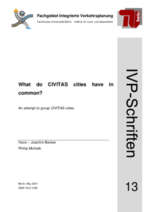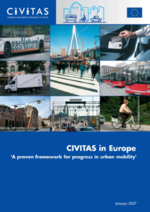
Pécs (Hungary)
With 170,000 inhabitants, Pecs is the fifth largest city in Hungary and is situated close to the border with Croatia. The city of Sopianae was founded here by the Romans at the beginning of the 2nd century, and by the 4th century it had become a significant early Christian centre. In November 2000, the city’s Christian burial chambers were included on the list of UNESCO World Heritage Sites.
The city has road and rail links with the Hungarian capital, Budapest, as well as with cities in Austria, Bosnia and Herzegovina and Croatia.
The transition period resulted in a huge demand for both private car parking spaces and public transport, as the number of cars and the number of tourists and students increased rapidly. Pecs has a number of overall transport objectives, including improving air quality, improving environmental living circumstances and reducing the use of fossil fuels.
The main focus for Pecs in CIVITAS I was to introduce a car-free zone in combination with a zone-model parking system with limited time parking and higher parking fees. Vehicle access to the city centre was limited in order to reduce air and noise pollution, resulting in a reduction in traffic and increased use of public transport.













